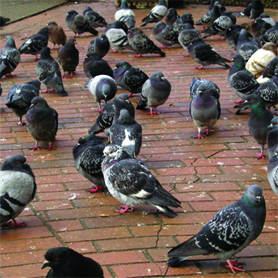The neighbors around 78th Street and 77th Place off 62nd Avenue have been having a major pigeon problem. The problem is being escalated to the point where neighbors are against neighbors. There is someone feeding these pigeons and the pigeons have adopted the back porches of this community as their feeding source. If something is said, people immediately think you hate animals which is not the case as most of us have had a pet at one time or another.
There are health risks from birds. Large populations of roosting birds may present a risk of disease to people. The most serious health risks arise from disease organisms that can grow in the nutrient rich accumulations of bird droppings, feathers and debris under a roost, particularly if roosts have been active for years. External parasites also may become a problem when infested birds leave roosts or nests. The parasites then can invade buildings and bite people.
Histoplasmosis – is caused by a fungus. The disease is transmitted to humans by airborne fungus spores from soil contaminated by pigeons and birds. Infection occurs when spores carried by the air are inhaled, especially after a roost has been disturbed. Infections are mild and can cause minor influenza like illness. On occasion, the disease can cause high fever.
Cryptococcus – pigeon droppings appear to be the most important source of the disease. Even when old and dry bird droppings can be a significant source of infection. Most infections are mild, but persons with weakened immune systems are more susceptible to infection. The generalized forms begin with a lung infection and spread to other areas of the body, particularly the central nervous system and are usually fatal unless treated.
While I’m on the subject of feces let us not forget the dog waste. Our park has become a wasteland of dog feces. According to the US Centers for Disease Control and Prevention pet droppings can contribute to diseases animals pass to humans called zoonoses. When infected dog waste is deposited, the eggs of certain roundworms and other parasites can linger in the soil for years. Anyone who comes into contact with that soil, be it through gardening, playing sports, walking barefoot or any other means, runs the risk of coming into contact with those eggs, especially your pet dog. Some hard-to-pronounce parasites could harbor hookworms, ringworms and tapeworms. Infections from these bugs often cause fever, muscle aches, headache, vomiting and diarrhea in humans. Children are most susceptible since they often play in dirt and put things in their mouths or eyes. With this information in mind, we hope that people will be more respectful of their community and the possible health risks they are causing by feeding birds and not picking up their dogs’ droppings.
© 2020 The Juniper Park Civic Association Inc. All Rights Reserved.
SERVING MIDDLE VILLAGE AND MASPETH SINCE 1938.



